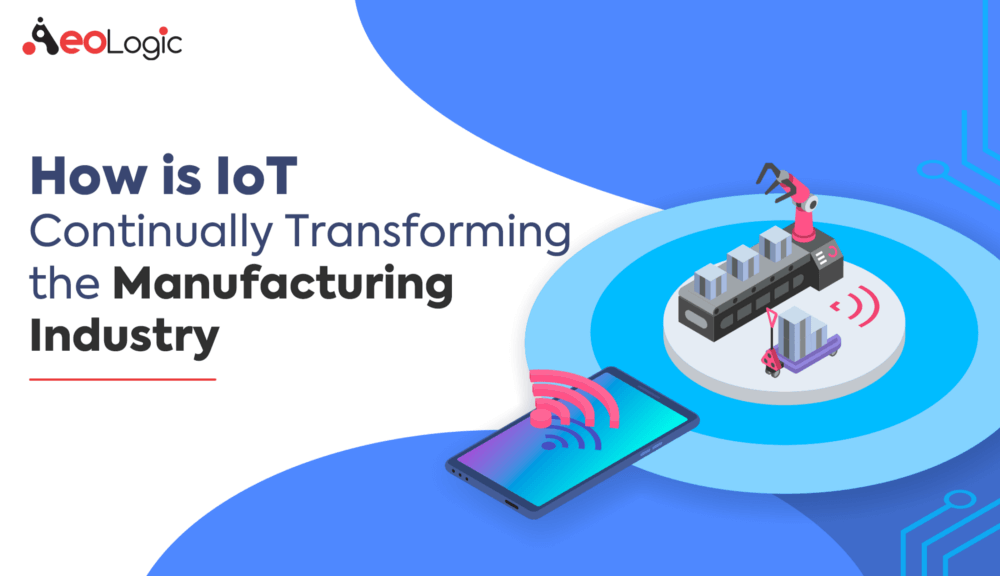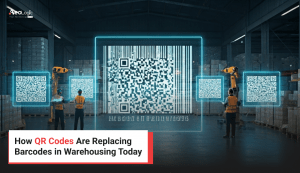Businesses change as technology changes. Paper-based, on-site systems have given way to enterprise applications and cloud-based solutions. Artificial intelligence, machine learning, virtual reality, unmanned systems, and more will continue to reshape business models and customer experience touchpoints within the service and manufacturing fields. And organizations are now using these revolutionary technologies to help generate greater revenue and improve the overall customer experience.
The manufacturing industry is undergoing a dramatic shift centered around new technologies that offer the promise of greater efficiency, speed, and higher quality. A central component of this shift toward Industry 4.0 is the internet of things (IoT), which serves as the frontline of data capture in the modern factory. What’s more, this datacentric focus extends well beyond the shop floor; the entire supply chain is coming under the watchful eye of IoT-enabled devices.
But what is IoT?
IoT refers to any system of physical devices that receive and transfer data over wireless networks without human intervention. This is made possible by integrating simple computing devices with sensors in all kinds of objects.
In simple terms, the Internet of Things (IoT) refers to an ongoing trend of connecting all kinds of physical objects to the internet, especially ones that you might not expect. This can mean everything from common household objects like refrigerators and lightbulbs to business assets like shipping labels and medical devices, to unprecedented wearables, smart devices, and even smart cities that only exist because of IoT.
IoT for Manufacturing
The manufacturing industry is one of the most affected and progressed industries at the hands of IoT. IoT is transforming the way organizations in different industries are doing business including the manufacturing companies. Till now technology has been used primarily for running the business and managing manufacturing operations, for automating processes and for collecting data related to assembly jobs. However, IoT goes well beyond this to the next level for data collection.
How is it helping to transform Manufacturing Industry?
IoT within just a short span has brought an exceptional disruption in the manufacturing domain while also offering immense hope for its automated future. Some of the major applications and advantages it can bring to this industry include:
Quality Control
In a standard reactive quality control process, manufacturers produce an item, their quality control unit tests it, and they hope to catch and rectify the flaws before the product reaches the market.
IoT makes this process proactive with thermal and video sensors collecting complete product data through different stages of a product cycle. The products can also be tested at each manufacturing step to check if their attributes are within specifications. In addition, instrumentation and monitoring of manufacturing equipment help quality control personnel to check if and where equipment calibration diverges from standard settings — such inaccuracies must be thwarted in time to avoid misalignment of products.
IoT’s support in monitoring both equipment settings and the outcomes of each production step gives manufacturers a stronger assurance of detecting quality problems at the source. Measures for improvement can, therefore, be taken in time.
Managing the Inventory
Together with (RFID), IoT makes inventory management an efficient and seamless process. Every item in the inventory gets an RFID tag, and each tag has a unique identification number (UID) comprising digital information about the item. RFID readers can scan the tags, and the data extracted gets transmitted to the cloud for processing.
The role of IoT here involves transforming the data acquired by RFID readers into useful business insights. It creates a record of the location of inventory items, their statuses, and their movements in the supply chain and gives users comparable results. For instance, as per the data on inventory quantity and location, IoT-based inventory management architecture can help calculate the volume of raw materials required for an impending manufacturing cycle. The outputs of IoT-based inventory management can be used in diverse ways. The system can send an alert to the users if any individual inventory item is missing and can notify them when they must replenish the materials.
Smart Metering
IoT has also introduced the manufacturing sector, utilities, and other industries to the world of smart meters that can monitor the consumption of water, electric power, and other fuels. IoT sensors allow organizations to gauge the specific use and deploy practices for more effective usage of resources.
With customizable end-user dashboards deployed by IoT services vendors, manufacturers can comprehensively analyze the results of smart meter monitoring. They can also compare costs, efficiencies, and the carbon footprint of alternative resources to incorporate better options in their manufacturing processes.
Smart Packaging
Smart packaging that directly uses materials with embedded interconnectedness provides advanced benefits of IoT for manufacturers. A prime aspect of smart packaging is that it enables consumers to engage with it, as well as generates data to handle a product more effectively. Smart packaging may manifest itself in the form of recipe videos, beauty tutorials, and other demonstrations to explain product usage.
IoT and packaging work together in different ways, including sensors, QR codes and augmented reality/virtual reality/mixed reality options. The idea is to add value for consumers and also collect data — through smart tracking — to further optimize operations and boost efficiency.
Conclusion
IoT promises to have a profound impact on manufacturing businesses allowing them to plan, control, integrate, analyze and optimize processes in a better manner by creating a network of connected machines, systems, devices, and humans. This connectedness and the data generated from this connected network will provide manufacturing companies with many potential opportunities such as improving operations, enhance customer experience, and strengthen supply chain, among others.
However, implementing IoT solutions in your organization can be challenging as it requires effective planning related to — defining the IoT architecture, data acquisition strategy, right IoT platform to integrate with existing technologies, security, data, etc. Having a right IoT partner can ensure effective planning and implementation of IoT solutions in the context of your business and faster realization of business value.
We, At Aeologic Technologies, combine our market research expertise across an array of technologies that help in building a better future. We’ve been carrying out qualitative and quantitative research projects for our clients for several years, establishing ourselves as the gold standard in reliable technical research.
For the last 8+ years, we have been giving Artificial Intelligence, Machine Learning & IoT based solutions for enterprises and governments across the globe.
Do you also have an amazing idea that can change the world? we’d love to hear it.

Manoj Kumar is a seasoned Digital Marketing Manager and passionate Tech Blogger with deep expertise in SEO, AI trends, and emerging digital technologies. He writes about innovative solutions that drive growth and transformation across industry.
Featured on – YOURSTORY | TECHSLING | ELEARNINGINDUSTRY | DATASCIENCECENTRAL | TIMESOFINDIA | MEDIUM | DATAFLOQ








